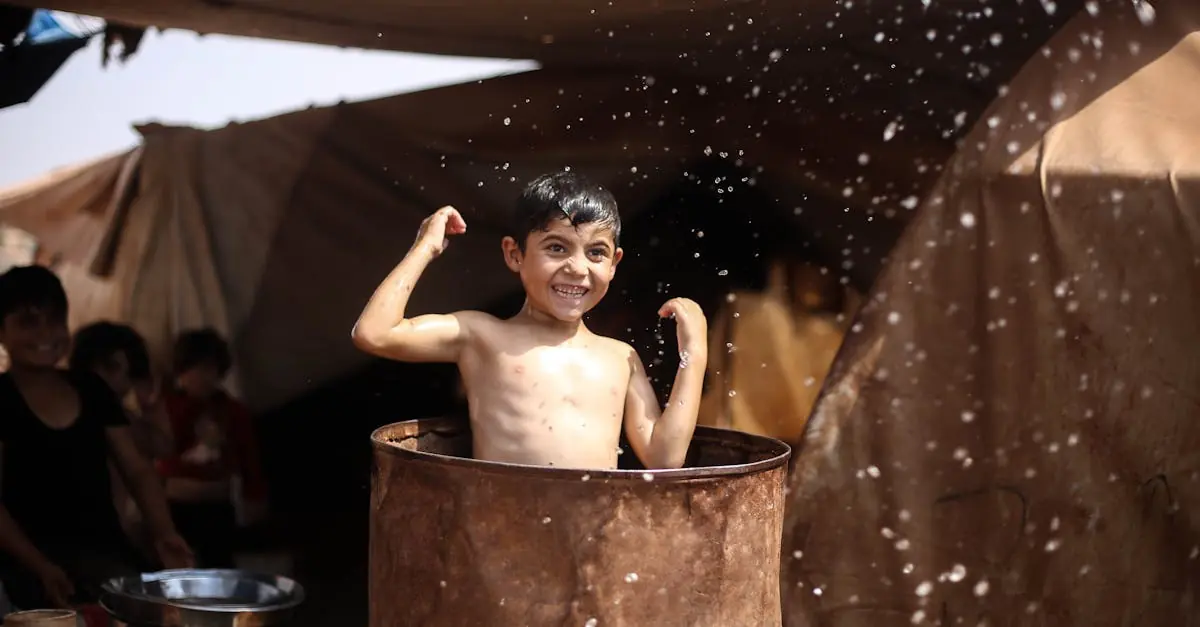Summer camp isn’t just for the typical adventurers; it’s a magical haven for kids with autism too. Imagine a place where laughter echoes through the trees, friendships blossom like wildflowers, and every child feels accepted just as they are. Summer camp for kids with autism offers a unique blend of fun and support, creating an environment where they can thrive.
Table of Contents
ToggleOverview of Summer Camp for Kids With Autism
Summer camps for kids with autism offer specialized programs tailored to meet the unique needs of these children. These camps provide structured environments that promote social interaction, communication, and skill development. Participants engage in various activities such as arts and crafts, sports, and sensory play, all designed to encourage learning and personal growth.
Trained staff members understand autism spectrum disorder and its challenges, ensuring that children receive appropriate support. Campers often form friendships in a setting where acceptance and understanding thrive. Enriched peer interactions build confidence and foster a sense of community among children.
Outdoor activities, like hiking and swimming, also play a significant role in the camp experience. These physical activities enhance both physical health and social skills. Camps often implement routines that help children feel secure and comfortable within their environment.
Each program may vary in terms of duration, activities, and structure, catering to different age groups and developmental levels. While some operate for a few weeks, others may extend throughout the summer. Parents can find valuable resources in organizations that specialize in autism-friendly camps.
Ultimately, summer camps designed for kids with autism create supportive atmospheres where children can thrive, develop friendships, and enjoy fulfilling summer experiences.
Benefits of Summer Camps
Summer camps for children with autism provide meaningful experiences that foster growth. They offer a plethora of benefits, particularly in social skill development and emotional growth.
Social Skill Development
Summer camps enhance children’s social skills through structured activities that encourage interaction. Group games and team projects require collaboration, allowing children to practice communication and teamwork. Campfire storytelling offers opportunities to share experiences, boosting confidence in expressing oneself. Meanwhile, interactive play areas enable natural peer engagement, helping children understand social cues better. Staff members trained in autism spectrum disorder guide interactions, ensuring positive experiences. As a result, friendships often form, creating lasting bonds that extend beyond camp.
Emotional Growth
Camps also promote emotional growth in children with autism. Supportive environments allow kids to express feelings in safe spaces. Activities tailored to interests encourage self-discovery and boost self-esteem. Children face challenges during camp activities, fostering resilience as they learn to manage frustrations and setbacks. Encouragement from peers and staff inspires a sense of belonging and acceptance. These experiences cultivate independence, as children learn to make choices and navigate social dynamics. This combination of support and independence leads to enhanced emotional regulation and confidence.
Types of Summer Camps
Summer camps for children with autism come in various formats, each designed to meet specific needs. Parents should explore different options to find the best fit for their child.
Traditional Camps
Traditional camps offer a mix of typical summer activities, including arts and crafts, sports, and nature exploration. These camps emphasize inclusion, allowing children with autism to participate alongside their neurotypical peers. Campers enjoy structured schedules filled with engaging activities that support social interaction. Staff trained in autism awareness provide essential guidance, ensuring all children feel included and respected. Opportunities for teamwork and collaboration arise through group projects and games, promoting friendship and communication. Families appreciate the balance of fun and support, which helps children build confidence in diverse environments.
Therapeutic Camps
Therapeutic camps focus on the specific developmental needs of children with autism. These camps incorporate behavioral therapies and individualized support tailored to each child’s challenges. Activities often center around social skills development, communication strategies, and sensory integration exercises. Structured environments foster safety, allowing children to explore new experiences and build resilience. Skilled professionals, such as therapists and educators, often lead programs, ensuring that children receive guidance suited to their abilities. Parents find therapeutic camps beneficial for enhancing social skills and emotional growth, making summer a time for meaningful progress and connections.
Choosing the Right Camp
Selecting the right summer camp for a child with autism involves careful consideration of several factors. Parents seek locations that create a safe and supportive environment for children to grow and connect with others.
Key Factors to Consider
First, assess the camp’s ability to cater to specific needs, including staff training in autism care. Consider the camp’s structure and routine, as consistency promotes comfort. Additionally, examine the camper-to-staff ratio to ensure sufficient attention for each child. Look for programs emphasizing social skills development through engaging activities. Nearby natural features provide opportunities for outdoor learning and physical activity. Explore any available resources or partnerships with autism organizations. Camps aiming for inclusivity can also help children support friendships with neurotypical peers.
Questions to Ask Camp Providers
Ask camp providers about their staff qualifications and training related to autism. Inquire about the daily schedule and routines, which help maintain comfort for children. Explore how the camp supports communication and social skill development through activities. Request information on how the camp handles behavioral challenges. Consider if there’s an open line of communication for parents during camp sessions. Determine if the camp organizes family events to foster connections among participants. Clarify emergency procedures for handling health or behavioral issues. By asking these questions, parents gain insights into the camp’s ability to meet their child’s unique needs.
Summer camps for kids with autism offer invaluable opportunities for growth and connection. These camps create an environment where children can thrive while participating in engaging activities tailored to their unique needs.
The support from trained staff fosters friendships and builds self-esteem, allowing children to explore their interests and develop essential social skills. Parents can find a range of camp options, ensuring they choose one that aligns with their child’s specific requirements.
Ultimately, summer camp can be a transformative experience, providing children with autism the chance to enjoy their summer while making meaningful memories and friendships.






